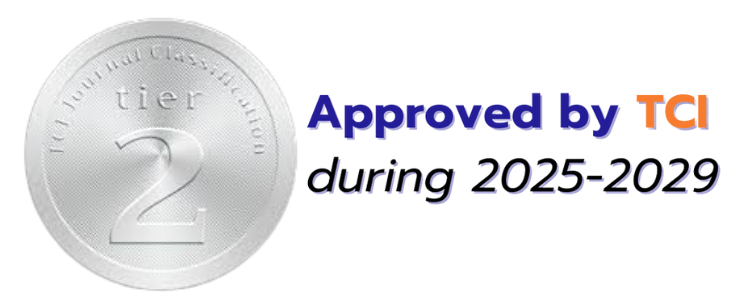Development of Mathematical Problem Solving Ability of grade 7 students Using DAPIC Problem Solving Process Combined with Socratic Questioning Techniques
Keywords:
DAPIC problem solving process, mathematical problem solving, Socratic questioning techniqueAbstract
This research aims to 1) compare the mathematical problem solving ability after learning using the DAPIC problem solving process with the Socratic questioning technique compared to the 70 percent criterion, 2) compare the learning achievement in applying linear equations with one variable before and after organizing the learning using the DAPIC problem solving process with the Socratic questioning technique, 3) compare the learning achievement in applying linear equations with one variable after organizing the learning using the DAPIC problem solving process with the Socratic questioning technique compared to the 70 percent criterion, and 4) study the satisfaction of grade 7 students toward organizing the learning using the DAPIC problem solving process with the Socratic questioning technique. The sample group used in this research was 40 grade 7 students of Samut Sakhon Burana School, who were randomly selected using a cluster random sampling. The one group pretest-posttest design was used. The tools were used in the research consisted of 1) lesson plan, 2) mathematical problem solving ability test, 3) mathematics achievement test and 4) satisfaction questionnaire. Statistics are used to percentage, mean, standard deviation, and t-test. The results before and after the research found that: 1) The mathematical problem solving ability after learning using the DAPIC problem solving process with the Socratic questioning technique was higher than the 70 percent criterion at a 0.05 level of statistical significance, 2) The learning achievement of grade 7 students after organizing the learning using the DAPIC problem solving process with the Socratic questioning technique was higher than before learning at a 0.01 level of statistical significance, 3) the learning achievement of grade 7 students after organizing the learning using the DAPIC problem solving process with the Socratic questioning technique was higher than the 70 percent criterion at a 0.05 level of statistical significance and 4) the satisfaction of grade 7 students after using the DAPIC problem solving process with the Socratic questioning technique was at a very satisfactory level.
Downloads
References
Basic Education Commission. (2017). Indicators and Core Learning Content for The learning content group Mathematics (Revised edition 2017). Bangkok: Agricultural Cooperative Assembly Press of Thailand. [translated]
Boonma, S. (2020). The development of cognitively guided instruction learning and Socratic questioning techniques to enhance mathematical thinking on inequality for Mathayomsuksa 3 students [Master of Education Degree, Naresuan University]. [translated]
Chantarawong, W. (2019). Effects Of Inquiry Learning Integrated With The DAPIC Problem-Solving
Process on The Critical Thinking Ability Of Grade 10 Students. [Master of Education Thesis, Srinakharinwirot University]. [translated]
Meethathong, S. (1991). Experimenting with mathematics teaching methods with the process of creating concepts Regarding multiplication and division problems for Grade 2 students [Thesis, Srinakharinwirot University]. [translated]
Ministry of Education. (2008). Basic Education Core Curriculum 2008. http://academic.obec.go.th/images/document/1559878925_d_1.pdf [translated]
Pinthong, S. (2011). A Comparison of Mathayomsuksa III Students Mathematical Problem
Solving Ability in Inequality and Attitude towards Mathematics Learning by Using SSCS Model and KWDL Technique [Master of Education Thesis, Srinakharinwirot University]. [translated]
PISA Thailand. (2022). Press conference on PISA 2022 assessment results. https://pisathailand.ipst.ac.th/news-21/ [translated]
Seanklom, T. (2020). Development of Learning Achievement and Problem Solving Skills in Mathematics of 7th Grade Students by Herbart Method With DAPIC Problem-Solving Process. Journal of Social Science Research, 11(2), 90-110. https://dept.npru.ac.th/jssr/data/files/11.2jssr6.pdf [translated]
Siripongnapat, V. (2023). The Enhancement of Active Citizenship for Learners through Socratic
Questioning. Journal of Education Studies Chulalongkorn University, 51(1), 1-13. https://digital.car.chula.ac.th/cgi/viewcontent.cgi?article=4055&context=educujournal [translated]
Sripirom, R. (2020). The Development of Mathematics Problem Solving and Critical Thinking Abilities of Grade 11 Students Using The SSCS Learning Model with DAPIC Concept. The 21st National Graduate Research Conference, 739-750. [translated] https://app.gs.kku.ac.th/gs/th/publicationfile/item/21th-ngrc-2020/HMP9/HMP9.pdf [translated]
Suwannatrai, Y. (2020). Development of Mathematical Problem Solving Ability and Learning Achievement in Logarithm Function of Mathayomsuksa Four Students by Organizing Learning Activities based on DAPIC [Master of Education Degree Thesis, Mahasarakham University]. [translated]
Worapin, K. (2019). The Study of Obstacles in Mathematics Problem Solving of Lower Secondary
Students. Technical Education Journal: King Mongkut’s University of Technology North Bangkok, 10(3), 60-66. http://journal.fte.kmutnb.ac.th/download/v10n3/journalFTE-Fulltext-2019-10-3-6.pdf [translated]
Downloads
Published
Issue
Section
License
Copyright (c) 2024 วารสารศาสตร์การศึกษาและการพัฒนามนุษย์

This work is licensed under a Creative Commons Attribution-NonCommercial-NoDerivatives 4.0 International License.







